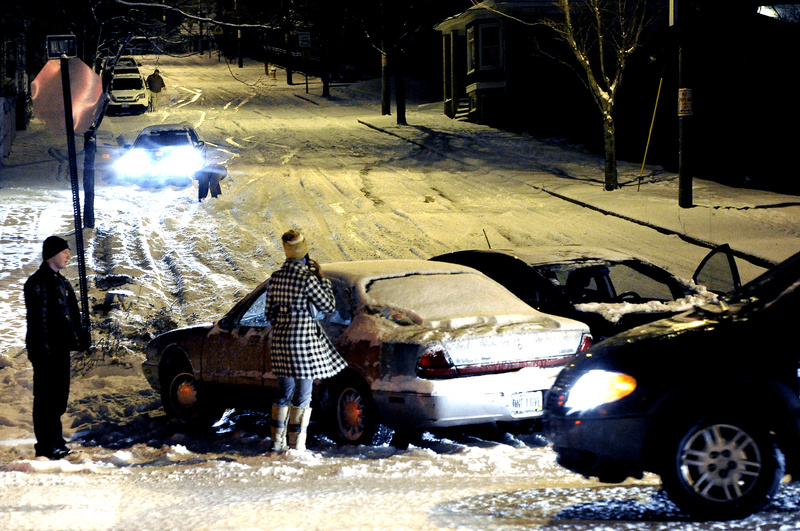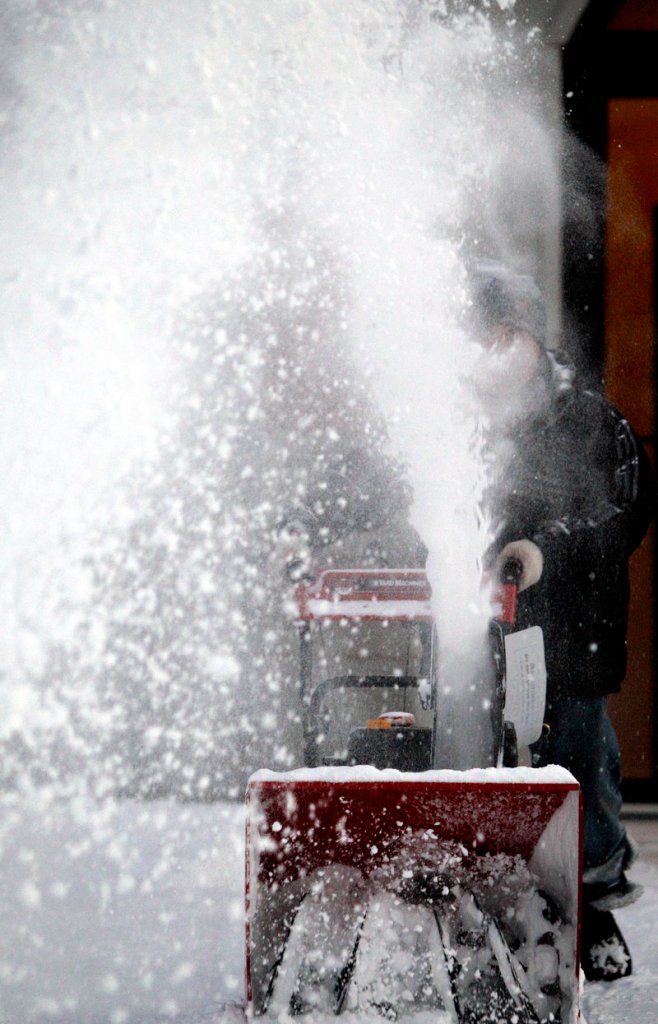It wasn’t supposed to happen. At least it hadn’t been forecast. But suddenly, there it was. About 3:30 in the afternoon of Dec. 20, it started. Large flakes blanketing the sky, rapidly covering everything.
By rush hour, it was a disaster, with 200 cars off the road in Scarborough alone. Three police cars and a fire truck in Portland were damaged when vehicles slid into them. There was a 17-car pile up in the heart of the city.
It was gridlock. An ambulance carrying an accident patient took one hour to get to the hospital. By 4:45 the Maine Turnpike had reduced the speed limit to 45 all the way from Biddeford to Augusta. Emergency crews were taxed and police could not respond to all the accidents, advising drivers to exchange information and report the accident later.
But this is Maine. This is to be expected. We are well-equipped to deal with this. As the evening wore on and traffic declined, road crews with their sand, salt, and plows converged on the roadways, freeing motorists from the ravages of the storm.
Throughout the night the streets were cleared and the salt worked its magic. As morning arrived and the temperatures began to rise, snow turned to slush, and motorists returned to their offices and factories.
Slowly, life went back to normal and we winter-toughened Mainers smugly relished our defeat of Mother Nature. As in the manner of our ancestors before us, another hardship had been faced and overcome.
But wait. There was something different about this ordeal. Something that shouldn’t be overlooked . During all the turmoil and tears, all the accidents and anger, it should be noted that we only got 2 inches.
How embarrassing.
Bob Quigley
Gray
In the quick snowstorm that overtook us on Dec. 20, I was heading home with all the others from work, being very careful, as I had already seen many accidents on the road.
As I approached the small hill on the New Portland Road in Westbrook heading for Gorham, my car decided to take over and spun me around sideways and put the front end in the ditch on the opposite side of the road.
I called the police, then my husband, and then AAA to have them tow me out, when a gentleman appeared at my window to inquire if I was OK. I assured him I was and that I had called the necessary people.
He then wondered how he could get me out of the ditch and said he had a strap and maybe he could pull me out, but he could not find a place to attach it on the car.
I don’t know if I reminded him of his mother or what, but he didn’t want to leave me where I was as it was on the side of a hill and on the opposite side of the road.
He wondered if he would be able to push me back up on the road so called his son Tyler from his car and with their pushing and my rocking the car we got it back on the road and I backed down the hill to a driveway where I could turn around.
All the time he stayed in front of me so no one would come over the hill and run into me. I was so stupid I didn’t even get his name so I could do something nice for him, but he did have a Westbrook Blue Blazes jacket on, as did his son.
I want to thank them from the bottom of my heart for their help and am so happy that there are still Good Samaritans out there in the world. God bless you both, and I hope you had a wonderful Christmas season.
Nancy A. Ryder
Buxton
Renewable energy worth supporting with subsidies
Chris Horner and William Yeatman of the Competitive Enterprise Institute argue in a column that government subsidies for renewable energy are wasteful because renewables cannot yet “compete” with fossil fuel energy in the marketplace (“Green energy colored by subsidies, not science,” Nov. 25).
Wind, solar and biomass energy, they complain, are still more expensive than coal and gas. My simple question to Horner and Yeatman: Do your “market” calculations include the human cost of coal miners’ lives? How about the human cost in terms of lung disease and other long-term health effects from coal-fired power plant emissions? What about drinking water contamination from mountaintop strip mining and “fracking?”
Taxpayers are subsidizing renewable energy because our existing fossil-fuel-based economy is utterly unsustainable. Fossil fuels are finite; renewable energy sources are infinite. The extraction and combustion of fossil fuels is increasingly harmful to people and to the planet we depend on for survival; renewable energy is benign, for the most part.
Renewable energy subsidies keep American taxpayer money at work in the United States, creating jobs and reducing our national dependence on unsustainable energy sources.
Did the authors consider that the U.S. coal industry enjoyed subsidies of around $17 billion between 2002 and 2008, including tax credits for production of “nonconventional” fuels ($14.1 billion), tax breaks on coal royalties ($986 million), exploration and development breaks ($342 million), according to a study by the Environmental Law Institute?
Could it be true that Horner and Yeatman prefer huge subsidies for the coal and gas industries because those are the types of companies that fund the ultra-conservative Competitive Enterprise Insititute?
Makes you wonder.
Phil Coupe
Cape Elizabeth
Maine not the right state for starting charter schools
I recently read in your paper that Gov.-elect. Paul LePage is considering charter schools for Maine. I would like to send the message to him that I fear investing scarce resources to this effort is going to divert them away from energy, health care costs, regulatory reform, resource management and tourism — things that really matter to Maine.
As a mom of kids in the public school system, I’ve been so impressed with the administration, the curriculum, teachers and the whole system. I think charter schools may be a good option for states where some schools are seriously failing — larger, poorer states and those states with very large urban inner-city centers; however, I do not think they are needed in Maine.
Almost weekly, I read in The Portland Press Herald of small island and northern Maine or rural public schools meeting the needs of the students in their towns.
I have also been impressed with how administration consolidation has been progressing. Let us keep up the good work Gov. Baldacci has begun and keep up that good work, Paul!
Heather Maines
Gray
Copy the Story Link
Send questions/comments to the editors.




Success. Please wait for the page to reload. If the page does not reload within 5 seconds, please refresh the page.
Enter your email and password to access comments.
Hi, to comment on stories you must . This profile is in addition to your subscription and website login.
Already have a commenting profile? .
Invalid username/password.
Please check your email to confirm and complete your registration.
Only subscribers are eligible to post comments. Please subscribe or login first for digital access. Here’s why.
Use the form below to reset your password. When you've submitted your account email, we will send an email with a reset code.